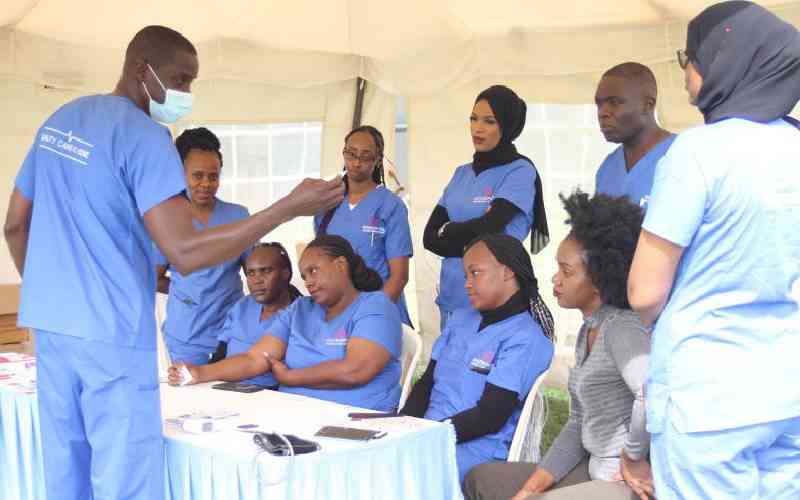Digital solutions to define the future of quality healthcare

Collected Image
The African Union Agenda 2063 envisions a prosperous continent based on inclusive growth and sustainable development.
For this to happen, there is need to safeguard the citizens’ healthcare and food security. Governments have prioritised achieving universal healthcare access in their national development agenda but progress has been hindered by the lack of sufficient investment. The story of health systems across the continent has mainly been dominated by lack of institutional integrity, inadequate human skills resources, and little financial and technical capacity.
The AU development agency, Nepad, admits the Covid-19 exposed the weaknesses of the fragile healthcare system. In a post in a blog series published in 2022 by the secretariat on behalf of the AU High-Level Panel on Emerging Technologies and the Calestous Juma Executive Dialogues, the agency notes that Africa has a heavy load of chronic diseases and roughly twice as many diseases per person as the rest of the world.
The fragility of the healthcare system has made it difficult for many people to access quality care, and early detection of disease and treatment. The costs are too high.
Insurance premiums are high and many employers can’t afford a health insurance policy for their frontline staff.
Even those who offer insurance are concerned about the rising cost. In Kenya, patients pay 32 per cent more for medicines than patients in the UK for the same medical condition.
Data from Statista shows that African countries had the highest share of the global population living below the extreme poverty line in 2022. But Africa’s health systems story could change following the proliferation of digital apps and increasing mobile connectivity.
The continent is already showing great strides in boosting telemedicine, eLearning and mobile health. In 2018, a study by Ernest & Young predicted that the core business of health will be anchored around digitally-enabled models of care, including virtual delivery and interactive person-centred tools.
That prediction is fast becoming a reality in Africa.
For this to happen, there is need to safeguard the citizens’ healthcare and food security. Governments have prioritised achieving universal healthcare access in their national development agenda but progress has been hindered by the lack of sufficient investment. The story of health systems across the continent has mainly been dominated by lack of institutional integrity, inadequate human skills resources, and little financial and technical capacity.
The AU development agency, Nepad, admits the Covid-19 exposed the weaknesses of the fragile healthcare system. In a post in a blog series published in 2022 by the secretariat on behalf of the AU High-Level Panel on Emerging Technologies and the Calestous Juma Executive Dialogues, the agency notes that Africa has a heavy load of chronic diseases and roughly twice as many diseases per person as the rest of the world.
The fragility of the healthcare system has made it difficult for many people to access quality care, and early detection of disease and treatment. The costs are too high.
Insurance premiums are high and many employers can’t afford a health insurance policy for their frontline staff.
Even those who offer insurance are concerned about the rising cost. In Kenya, patients pay 32 per cent more for medicines than patients in the UK for the same medical condition.
Data from Statista shows that African countries had the highest share of the global population living below the extreme poverty line in 2022. But Africa’s health systems story could change following the proliferation of digital apps and increasing mobile connectivity.
The continent is already showing great strides in boosting telemedicine, eLearning and mobile health. In 2018, a study by Ernest & Young predicted that the core business of health will be anchored around digitally-enabled models of care, including virtual delivery and interactive person-centred tools.
That prediction is fast becoming a reality in Africa.
Source: https://www.standardmedia.co.ke
Previous Story
- Africa likely to capture 10% of global green...
- Africa's oldest dinosaur found in Zimbabwe
- African countries must diversify exports to survive global...
- Africa looks at indigenous crops to overcome food...
- Africa faces grain shortage and sharp rise in...
- Go to Africa partners with Dian Fossey Gorilla...
- In Africa, rescuing the languages that Western tech...
- Mena's quick-commerce market to be valued at $47bn...